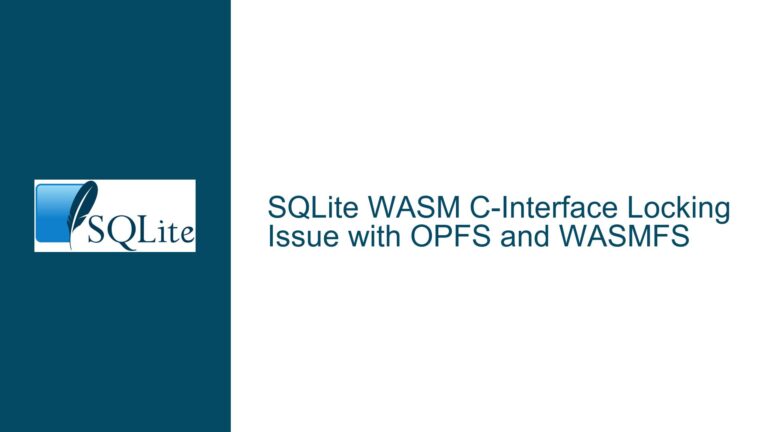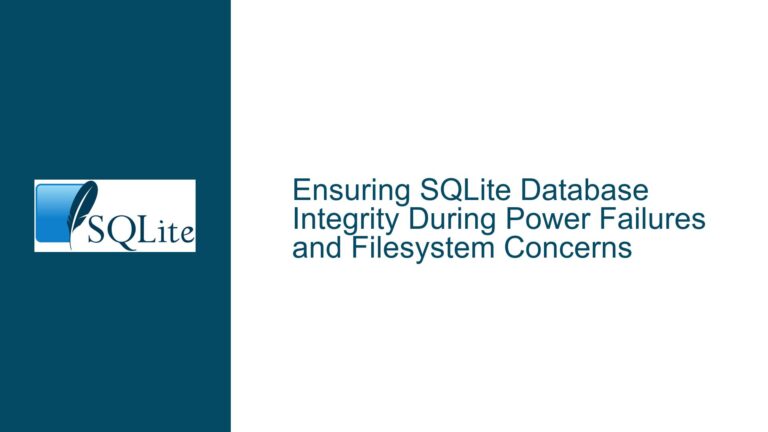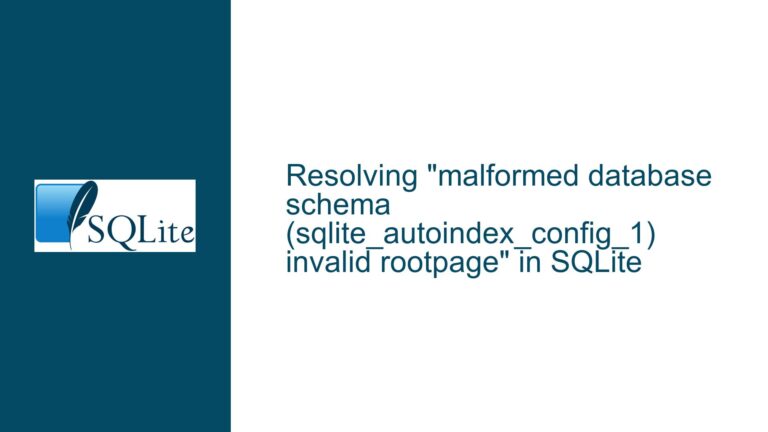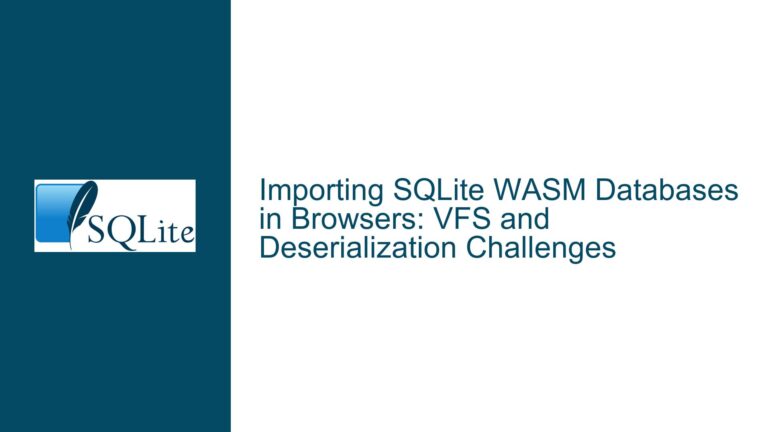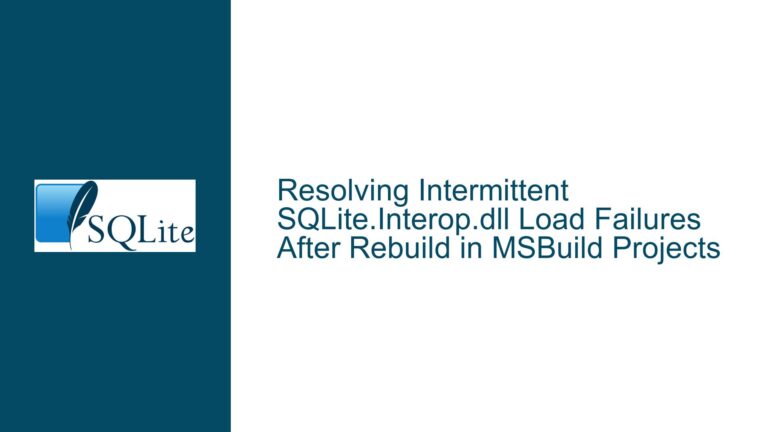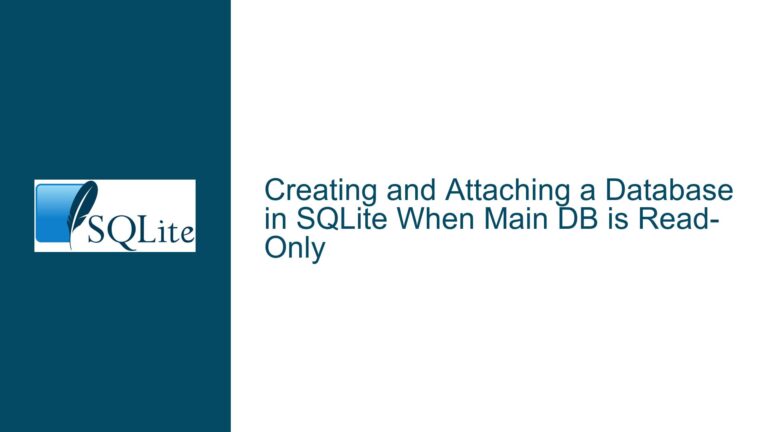Resolving x64 Build Errors for SQLite3.exe with NMAKE in Visual Studio 2022
Linker Architecture Mismatch and Unresolved Symbol Errors During x64 SQLite3 Build
Issue Overview: LNK1112 Module Machine Type Conflict and LNK2019 Unresolved External Symbol
The core challenge arises when compiling SQLite3 as a 64-bit executable (sqlite3.exe) or dynamic link library (DLL) using Microsoft’s NMAKE build system with Visual Studio 2022 toolchain. Two distinct errors manifest during this process:
LNK1112 Module Machine Type ‘x86’ Conflicts with Target Machine Type ‘x64’
This occurs during initial build attempts when the linker detects object files (e.g., sqlite3.lo) compiled for 32-bit (x86) architectures being linked into a 64-bit (x64) target. The error explicitly references a mismatch between the machine type of compiled objects and the intended output platform.LNK2019 Unresolved External Symbol _guard_dispatch_icall
After addressing environment configuration issues, a secondary error emerges where the linker fails to resolve_guard_dispatch_icall, a security-related symbol tied to Control Flow Guard (CFG), a Microsoft exploit mitigation technology. This manifests when linking the final DLL or executable, preventing successful build completion.
These errors reflect deeper issues in environment configuration, build toolchain selection, and compiler/linker flag compatibility. The first error stems from improper toolchain activation, while the second reveals subtler interactions between security features and legacy build configurations.
Possible Causes: Environment Configuration and Security Mechanism Conflicts
Three primary factors contribute to these build failures:
Incorrect Developer Command Prompt Environment
Visual Studio provides multiple command prompt shortcuts preconfigured for specific architectures. Using the generic "Developer Command Prompt" without explicit architecture flags (-host_arch=amd64 -arch=amd64) initializes environment variables (e.g.,PATH,LIB,INCLUDE) for 32-bit toolchains by default. This causes:- Compiler (
cl.exe) to generate 32-bit object files - Linker (
link.exe) to reference 32-bit libraries - Host tools (e.g.,
nmake) to invoke x86 versions of build utilities
- Compiler (
Makefile.msc Platform Configuration Oversights
SQLite’sMakefile.mscuses thePLATFORMvariable to set architecture-specific flags. Insufficient or conflicting flags for x64 builds result in:- Missing
/MACHINE:X64linker directives - Incorrect library paths (e.g., linking against 32-bit CRT libraries)
- Improper preprocessor definitions affecting pointer sizes or API selections
- Missing
Control Flow Guard (CFG) Compatibility Issues
Modern Visual Studio versions enable CFG by default, injecting calls to_guard_dispatch_icallfor indirect function pointer validation. SQLite’s source code and build configuration may not account for this:- Missing
/guard:cfor conflicting CFG-related linker flags - Undefined references when CFG is partially enabled
- Incompatibility with SQLite’s function pointer usage in hooks or extensions
- Missing
Troubleshooting Steps: Environment Validation, Makefile Adjustments, and CFG Resolution
Step 1: Validate and Configure the Build Environment
Launch the Correct Command Prompt
Use "x64 Native Tools Command Prompt for VS 2022" from the Start menu (installed with Visual Studio). This preconfigures:PATHto prioritize 64-bit toolchain binaries (HostX64\x64\)LIBandINCLUDEvariables pointing to x64 SDK librariesVSCMD_ARG_HOST_ARCHandVSCMD_ARG_TGT_ARCHset toamd64
Verify environment variables:
echo %VSCMD_ARG_HOST_ARCH% # Should output "amd64" where cl.exe # Path should include "HostX64\x64\"Avoid Manual Environment Overrides
Discard attempts to force architecture viaVsDevCmd.bat -host_arch=amd64 -arch=amd64, as this may not fully replicate the Native Tools environment. Instead, rely on the dedicated shortcut.Clean Build Directory
Delete all intermediate files (*.lo,*.ilk,*.pdb) and outputs (*.dll,*.exe) to prevent residual 32-bit objects from causing LNK1112.
Step 2: Adjust Makefile.msc for x64 Compatibility
Explicitly Set Platform and Target
EnsurePLATFORM=x64is passed tonmake:nmake /f Makefile.msc PLATFORM=x64Inspect
Makefile.mscfor conditional blocks using!IF "$(PLATFORM)"=="x64"to confirm x64 flags are applied.Verify Linker Flags
The linker command line must include:/MACHINE:X64for target architecture- Correct SDK library paths (e.g.,
\Windows Kits\10\lib\10.0.19041.0\ucrt\x64) - No conflicting
/NODEFAULTLIBdirectives excluding x64 CRT libraries
In
Makefile.msc, ensureLTLINKOPTSincludes:LTLINKOPTS = /NOLOGO /MACHINE:X64 /DYNAMICBASE /OPT:REF ...Adjust Compiler Flags for x64
Confirm/D_WIN64is defined for 64-bit builds, ensuring type correctness (e.g.,size_tas 64-bit). InMakefile.msc:!IF "$(PLATFORM)"=="x64" TCC = $(TCC) /D_WIN64
Step 3: Resolve Control Flow Guard (CFG) Symbol Issues
Disable CFG Temporarily
Add/guard:noto linker flags to eliminate_guard_dispatch_icalldependencies:LTLINKOPTS = $(LTLINKOPTS) /guard:noRebuild and verify if the LNK2019 error disappears.
Integrate CFG Compatibility
If CFG is required for security compliance, modify SQLite source code to include<cfguard.h>and reference_guard_dispatch_icallappropriately. For SQLite hooks likesqlite3_rollback_hook, wrap indirect calls:#include <cfguard.h> void (*rollback_hook)(void *); rollback_hook = sqlite3_rollback_hook(db, callback, data); _guard_dispatch_icall(rollback_hook);Update CRT Library References
Ensure the linker references the x64 version oflibucrt.liborucrt.libby modifyingLIBenvironment variable or makefile entries:LIBS = $(LIBS) "C:\Program Files (x86)\Windows Kits\10\Lib\10.0.19041.0\ucrt\x64\ucrt.lib"
Step 4: Advanced Diagnostics and Workarounds
Inspect Object File Architectures
Usedumpbin.exe /headers sqlite3.loto check themachinefield. For x64 builds, it should readx64.Isolate Linker Command Lines
Runnmake /nologo /f Makefile.msc PLATFORM=x64 prepto generate intermediate files, then manually execute the failing linker command with/VERBOSEto trace unresolved symbols.Use Alternative SDK Versions
If unresolved symbols persist, switch Windows SDK versions via Visual Studio Installer to ensure compatibility between CRT headers and libraries.
By systematically addressing environment configuration, makefile flags, and CFG integration, developers can reliably produce x64 builds of SQLite3.exe and associated DLLs using NMAKE and Visual Studio 2022.

